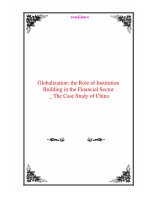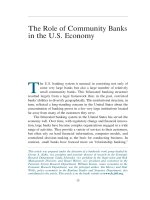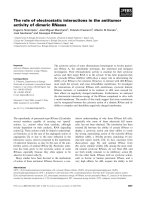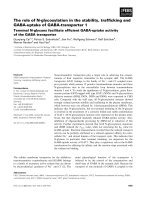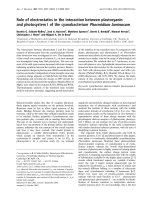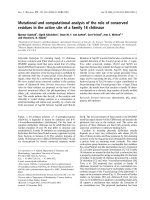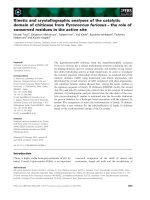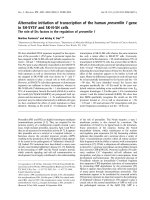Mediating role of psychological well-being in the relationship between self-esteem and university students’s academic performance
Bạn đang xem bản rút gọn của tài liệu. Xem và tải ngay bản đầy đủ của tài liệu tại đây (395.31 KB, 12 trang )
International Journal of Management (IJM)
Volume 11, Issue 1, January 2020, pp.145–156, Article ID: IJM_11_01_015
Available online at />Journal Impact Factor (2019): 9.6780 (Calculated by GISI) www.jifactor.com
ISSN Print: 0976-6502 and ISSN Online: 0976-6510
© IAEME Publication
Scopus Indexed
MEDIATING ROLE OF PSYCHOLOGICAL WELL-BEING IN
THE RELATIONSHIP BETWEEN SELF-ESTEEM AND
UNIVERSITY STUDENTS’S ACADEMIC PERFORMANCE
Alexius Wantur
Faculty of Psychology, Universitas Persada Indonesia Y.A.I
Diponegoro Street No. 74, Central Jakarta, Indonesia
Asmadi Alsa
Faculty of Psychology, Universitas Persada Indonesia Y.A.I
Diponegoro Street No. 74, Central Jakarta, Indonesia
Wazar Pulungan
Faculty of Psychology, Universitas Persada Indonesia Y.A.I
Diponegoro Street No. 74, Central Jakarta, Indonesia
ABSTRACT
This paper aims at measuring the mediating effect of psychological wellbeing in
the relationship between university students’ self-esteem and their academic
achievement, as well as examining the direct and indirect effect of peer-support to
academic achievement through psychological wellbeing. For these purposes, a
quantitative research with specific reference to empirical survey was conducted with
the active participation of 204 university students. Results of structural equation
modelling (SEM) analysis indicate that there was a positive and significant mediating
effect of psychological wellbeing in the relationship between self-esteem and students’
academic achievement. However, the direct effect of students’ peer-support to their
academic achievement was greater compared to its indirect effect through students’
psychological wellbeing. This concludes that both psychological wellbeing and peersupport play significant roles in supporting the academic achievements of students.
This study implies the significance of these variables to the academic achievement of
students and accordingly government and university stakeholders should pay more
attention in presenting these variables within the academic environment of university.
Keywords: Self-esteem, Psychological wellbeing, Peer-support, Academic
achievement, University students
Cite this Article: Alexius Wantur, Asmadi Alsa and Wazar Pulungan, Mediating Role
of Psychological Well-Being in the Relationship between Self-Esteem and University
Students’s Academic Performance, International Journal of Management, 11 (1),
2020, pp. 145–156.
/>
/>
145
Mediating Role of Psychological Well-Being in the Relationship between Self-Esteem and University
Students’s Academic Performance
1. INTRODUCTION
Higher education as one of the educational institutions is required to be able to produce
graduates who have quality in accordance with the needs of the community. In this context, it
has become one of major challenges in tertiary institution (Caroline, 2008, p. 1). The success
of the teaching and learning process can be measured from the students’ academic
achievement at the end of semester, known as grade point average (GPA). Thus the academic
achievement of students can be shown by the GPA score. The scores reflect the various
students’ efforts, including their ability, fatigue, and academic potentials (Siagian, 2003, p.
223).
Various studies in the field of educational psychology have been conducted to understand
the factors associated with academic achievement. In fact, empirical evidence of the role of
self-esteem in academic achievement has been found from the 1960s to the 1990s
(Coopersmith, 1967; Covington, 1989; Erikson, 1968; Holly, 1987; Purky, 1970; Reynolds,
1988; Scheirer & Krant, 1979; Walz & Bleuer, 1992; Wylie, 1979). However, these studies
have contradicted to each other. For instance, several studies in the last two decades, found
that self-esteem has a positive and statistically significant role in the academic achievement
(Colquhoun & Bourne, 2012; Lockett and Harrell, 2003); Reasoner, 2005). Other studies also
affirmed the positive role of self-esteem on academic achievement. In contrast, several
researchers found that there is no correlation between self-esteem and academic achievement
(Di Giunta., Et al., 2013; Zheng, et al., 2014). Several other researchers also asserted that new
self-esteem can affect academic achievement, if there are other variables that are examined
(Afari et al., 2012). Likewise, Kohn (1994) affirmed that it is not self-esteem that affects
academic achievement, but academic achievement that affects self-esteem.
This paper contributes in the debates of recent literature above. The major purpose of this
paper is to examine the direct effect of self-esteem to academic achievement of higher
educatin students, as well as examine the indirect effect with the mediating variable of
psychological wellbeing. In this regard, previous research affirms that psychological wellbeing has positive and significant mediating role in the relationship between self-esteem and
academic achievement (Afari, et al., 2012; Turashvili & Japaridze, 2012). Other important
factor that relates to academic achievement is peer-group support and accordingly, this paper
also examines the direct and indirect effect of students’ peer group support to academic
achievement.
2. RELEVANT LITERATURE REVIEW
2.1. Concept of Academic Achievement
Academic achievement is the result of learning in the academic field that reflects the ability
and performance of students on subject matter that is multidimensional, in this case includes
cognitive, affective and psychomotor aspects, which are given by educators to students who
are usually indicated by grades (Fatimah & Fasikhah, 2013). Academic achievement
according to Syah (2010, p. 144) academic achievement is the level of student success in
achieving the goals set in a program. In this case academic achievement is a real ability of
students as a result of efforts made during one particular semester in the form of final
semester scores. This can be seen in the cumulative achievement index (GPA) of each
student.
Winkel (2004, p.15) defines academic achievement as "the results of efforts that can be
achieved by students after doing the learning process that takes place in the interaction of the
subject with the environment that will be stored or implemented towards progress".
According to Alwi (2005) academic achievement is the mastery of knowledge or skills
/>
146
Alexius Wantur, Asmadi Alsa and Wazar Pulungan
developed from subjects, generally indicated by the value of test results or numbers given
lecturers or educators, and abilities that really exist or can be observed (actual abilities) and
which can be measured directly using certain tests.
2.2. Concept of Self-Esteem
The theoretical concept of self-esteem has been advanced by many psychologists in the past
decade. According to Whelpley and McDaniel (2016) self-esteem is a comprehensive selfevaluation of both positive and negative evaluations of oneself. Specifically explained that
individuals who have high self-esteem tend to be more proactive, optimistic, and have a
higher level of social activity compared to individuals who have low self-esteem. Sarlito
(2009, p. 62) explains that self-esteem shows the overall attitude of individuals towards
themselves both positive and negative. This view is quite different from what raised by Reber
and Reber (2010) regarding self-esteem as the degree or degree of individuals assessing
themselves. Santrock (2007, p. 183) explains that self-esteem is often referred to as self-worth
or self-image, as these are a global evaluative dimension of self.
According to Hibbert, (2013) self-esteem is the same concept as a self-image but there is
still a very small difference: self-esteem is everything that is thought, felt, and believed about
oneself. In contrast to what is meant by self-image is the overall recognition that individuals
are valuable human beings and creatures that need to be loved. Herbbert shows that each
individual has a different self-esteem. With these small differences can show the uniqueness
of each individual. Other scholars (Baron & Byrne, 2012) argue that self-esteem is a selfevaluation made by each individual, people's attitudes towards themselves in the range of
positive to negative dimensions. Baron and Byrne further asserted that self-esteem refers to
one's attitude towards himself, ranging from very negative to very positive attitude. The
individuals shown appear to have negative attitudes towards themselves. High self-esteem
means that the individual likes him/herself. This positive evaluation is partly based on the
opinions of others and partly based on specific experiences. The formation of attitudes
towards self begins with the interaction between the baby and his mother or other caregivers
in the family. Cultural differences also affect one's self-esteem.
The dimensions and or elements of self-esteem in this study are adapted from the several
experts (Coopersmith, 1983; Robertson, 1986; Susanti, 2012), namely: 1) significance
(feelings), feelings to be loved and cared for; 2) ability (Competence) that the feeling of being
able (successfully fulfilling the demands of achievement) when he is compared to others; 3)
strength and power (Power), which is seen when individuals are able to control, regulate and
control the behavior of themselves and others based on the existence of reinforcement and
respect received by individuals from other individuals; and 4) goodness or virtue, compliance
in following moral ethical standards that exist in society. The more obedient, the greater the
ability of individuals to become role models, so the higher the community's acceptance of the
individual concerned.
2.3. Relationship between Self-Esteem and Psychological Wellbeing
The study of the relationship between self-esteem and psychological well-being of students
has been conducted by several previous researchers (Nwankwo, Okechi & Nweke, 2015). The
study sample was 350 student athletes at Ebonyi University, Nigeria. On the basis of
correlation and t-test analysis, the study proved a strong correlation between self-esteem and
Psychological well-being. It was found that the higher the self-confidence of students, the
higher the level of psychological well-being of students. The study was conducted with purely
quantitative research and the researchers suggested the need for further research with a
qualitative approach to further explore this relationship. The researchers' suggestions
/>
147
Mediating Role of Psychological Well-Being in the Relationship between Self-Esteem and University
Students’s Academic Performance
encourage the use of quantitative and qualitative (mixed-methods research) combined
research in this study.
Likewise, the findings of other researchers who showed that self-esteem had a positive
effect on psychological well-being, a study in China of 847 students (Du, King & Chi, 2017).
In this study, by involving a broad sample of students in China (N = 847), it is evident that
students who have high self-esteem demonstrate high life satisfaction and meaning in life as
well. The research can be used as a reference in this study, to test whether self-esteem affects
the psychological well-being of students. Furthermore, research conducted by Paradise and
Kernis (2002) shows that there is a relationship between self-esteem and psychological wellbeing. Self-Efficacy Stability correlates with all aspects (except personal growth), and the
personal growth subscale which shows a comprehensive and better relationship than selfesteem and the attractiveness of well-being. In addition, research conducted in Indonesia
conducted by Susanti (2012) also found that there was a positive relationship between selfesteem and psychological well-being. This means that the higher the self-esteem, the higher
the psychological well-being.
2.4. Relationship between Self-esteem and Student Achievement
Research conducted by several researchers (Du, King, & Chi, 2017) indicate that self-esteem
has a positive and significant effect on psychological well-being. In the study, by involving a
broad sample of students in China (N = 847), it was evident that students who had high selfesteem showed high life satisfaction and meaning in life. Previous researchers (Emadpoor,
Lavasani & Shahcheraghi, 2016) have also proven the positive and significant direct influence
of peer support on psychological well-being. Several indicators of psychological well-being in
the study are self-acceptance, positive relations with others, self-autonomy, self-growth, and
life goals. In the last three years, there have been studies (Arshad, Zaidi & Mahmood, 2015;
Koruk, 2017) that show a positive and significant relationship between self-esteem and
student academic achievement. Specifically, Khoruk (2017) found a high influence of selfesteem on student academic achievement.
2.5. Concept of Psychological Wellbeing
For more than two decades, many scholars explain about psychological wellbeing. Ryan and
Deci (2001) distinguish psychological well-being into two views. The first view is called
hedonism which reflects that well-being consists of pleasure or happiness. This hedonic or
hedonist school is based on a theory developed by the philosophical tradition developed by
Hobbes, Locke and Rousseu. Hedonists emphasize individuals and it is assumed that
individuals are driven to achieve personal freedom. The hedonic tradition is based on a
philosophical tradition developed by Hobbes, Locke and Rousseu. Accordingly, the focus is
on the integrity of the individual and his own assessment of what makes him happy. The
second view, views that well-being is not just happiness but is related to human potential.
Ryan and Deci (2001) also said that psychological well-being is a way for someone to
overcome all challenges or problems in daily life. Students who have high psychological wellbeing will feel comfortable in learning and completing tasks well.
In the development of psychological well-being, Keyes, Ryff, & Shmotkin (2002, p.
1007define psychological well-being is a picture of the way individuals deal with challenges
throughout life. So, in this case psychological well-being does not only talk about life
satisfaction, happiness and balance between negative and positive attitudes, but also involves
views about problems in one's life. Based on this view, each task, tests given to students is
something that can increase the existing potential for achieving high academic achievement.
Likewise, Sumule (2008) define psychological well-being as an eudemonic perspective
/>
148
Alexius Wantur, Asmadi Alsa and Wazar Pulungan
(happiness to self-actualize) from the mental well-being of individuals whose focus is on
psychological utilization and self-realization to measure the extent to which a person values
his woman in an effort to meet her needs and development himself. The same thing also stated
Ryff & Singer (2008), said that self-realization is related to all the potential possessed by an
individual which is an illustration of the achievement of the welfare of one's life.
Suresh, et al., (2014: 2) say that psychological well-being is an individual who is able to
feel something and can function well and effectively. Individuals who have good feelings
mean to present positive emotions such as; satisfaction and happiness, self-confidence and
interest. While being able to function effectively includes various things such as; able to
control behavior and emotions, can exploit their potential, have a purpose in life and build
positive relationships with others. The same thing also stated by Huppert (2009: 1)
psychological well-being is a life that goes well. This is a combination between positive
feelings that functions effectively. Individuals who have high psychological well-being will
have a feeling of pleasure, being able, getting support from the surrounding environment and
feeling satisfied with their daily lives.
2.6. Concepts of Psychological Wellbeing
The psychological wellbeing dimensions used in this study were adapted from Ryff (1989).
First, the dimension of self-acceptance, that is, individuals who have a high score on this
dimension have a positive attitude towards themselves, acknowledge and accept the goodness
and self- ugliness as they are, feel positive about past lives and vice versa, individuals who
have scores Low feel dissatisfied with yourself, disappointed with what has happened in the
past life, has problems with certain personal qualities and has different expectations from the
current self. Second, positive relationships with others (positive relations with others), i.e.
individuals with high scores on this dimension have warmth, satisfaction, trusting
relationships with others, care about the welfare of others, are able to display empathy,
affection, and intimacy that strong, and understand the human relations that give and take and
vice versa, individuals with low scores have few close and trusting relationships with others,
find it difficult to be warm, open, and care for others, feel alienated and frustrated in
interpersonal relationships, and not willing to make compromises to maintain important ties
with others.
Third, personal growth (personal growth), that individuals with high scores in this
dimension have a feeling of continuous development, see themselves as self-developing and
expanding, open to new experiences, realize their own potential, see improvements in
themselves and behavior throughout time , and change to reflect more self-knowledge and
effectiveness and vice versa, individuals with low scores have a feeling of personal
stagnation, lack of awareness of improvement or expansion over time, feel bored and
uninterested in life, and feel unable to develop attitudes or behaviour that are new.
Fourth, the purpose of life (purpose in life), that individuals with high scores on this
dimension have a purpose in life and awareness of courage, feel there is meaning in life now
and in the past, hold beliefs that give purpose to life, and have goals and objectives for life
and vice versa, individuals with low scores have a lack of meaningful meaning in life, have
few goals or goals, lack awareness of direction, do not see goals in past lives, and do not have
attitudes or beliefs that give meaning to life. Fifth, mastery of the environment (environmental
mastery) that individuals who score high on this dimension have a feeling of mastery and are
able to manage the environment, control the complex arrangement of external activities, use
opportunities in the surrounding environment effectively, be able to choose or create contexts
that suit their needs and personal values and vice versa, in individuals who have low scores
have difficulty managing daily affairs, feel unable to change or improve the context in the
/>
149
Mediating Role of Psychological Well-Being in the Relationship between Self-Esteem and University
Students’s Academic Performance
surrounding environment, are not aware of opportunities in the surrounding environment, and
lack of awareness of control over the external world. Sixth, autonomy (autonomy), that
individuals who have high scores in this dimension are determined, independent, able to resist
social pressure to think and act in certain ways, regulate their behavior from within, and
evaluate themselves with personal standards.
2.7. Relationship between Psychological Wellbeing and Student Achievement
Previous research conducted by Turashvili and Japaridze (2012) proves that psychological
well-being has a positive and significant influence on academic achievement. In the study,
students who had medium and high achievement levels had high index scores related to
psychological well-being including life goals, and personal growth. The same thing was also
found in the study of Topham and Moller (2011) showing that psychological well-being
correlated with the academic achievements of new students enrolled at UK University with
results (r = 0.15; p <0.001). Similarly, Hamdana and Alhamdu's (2015) conduct research on
subjective well-being and student achievement in acceleration at senior public school in
Palembang. The study found that there is a significant correlation between subjective wellbeing and student learning achievement. More specifically, subjective well-being contributes
about 76.9% to the student achievement.
Furthermore, other study was conducted to examine the relationship between self-esteem
and psychological well-being of students (Nwankwo, Okechi & Nweke, 2015). For the
purpose of the study, an empirical survey was cinducted with the active participation of 350
students at the Ebonyi University, Nigeria. On the basis of correlational and t-test analysis,
there was a strong correlation between self-esteem and psychological well-being. In this
context, the higher the self-confidence of students, the higher the level of their psychological
well-being.
2.8. Concept of Peer-Support
Peer support is an important component in the lives of individuals in society. According to
Sarafino (2011) peer support is assistance given to individuals, so that individuals feel cared
for, valued, and feel safe. Taylor (2015) defines social support as information from others that
they are loved and cared for, valued and valuable, and part of a communication network and
shared obligations. The individual feels that he / she receives himself in the environment
where he is and receives social support from the surrounding community. Meanwhile,
Vangelisti (2009) divides the notion of social support into three perspectives. The first
perspective is a sociological perspective that focuses on the degree to which individuals
integrate in existing social groups. Secondly, psychological perspective that emphasizes on
the availability of perceived support from the environment. Third, a communication
perspective that focuses on the interaction between providers and recipients of support.
According to Sarafino (2006) social support is a way to show affection, care, and
appreciation for others. Individuals who receive peer support will feel themselves loved,
valued, valuable, and are part of their social environment. In other words peer support is one's
self-acceptance by the environment. King (2010, p.226), affirm that social support is
information and feedback from other people that shows that someone is loved and cared for,
valued, respected, and involved in communication networks and mutual obligations. King
sees social support as a result of actions and reactions to information in the surrounding
environment. The dimension of peer support in this study was adapted from Cutrona and
Gardner; Uchino (in Sarafino & Smith, 2011), namely: 1) emotional support or appreciation
support (emotional support or esteem support). Expressing empathy, caring, caring, looking
positive, and encouraging someone; 2) tangible or instrumental support. Involve direct
/>
150
Alexius Wantur, Asmadi Alsa and Wazar Pulungan
assistance, such as lending money, or helping to complete work when the workload is
excessive; 3) information support (informational support). Information support includes
providing advice, direction, advice, and feedback; and 4) companionship support that refers to
the readiness of others to spend time with individuals.
2.10. Relationship between Peer-support and Psychological Wellbeing
Previous researchers (Emadpoor, Lavasani & Shahcheraghi, 2016) have proven the positive
and significant direct influence of social support on psychological well-being. Some
indicators of psychological well-being in the study are self-acceptance, positive relations with
others, self-autonomy, self-growth, and life goals. Lahti and Liebkind (2014) in their research
found that social support had a significant impact on psychological well-being. Furthermore,
research conducted by Gulacti (2000) found that perceived social support predicted 43% of
psychological well-being. In addition to this, it was also found that predicted family support
predicts Psychological well-being, and on the other hand perceived support for someone
special and perceived peer support do not predict Psychological well-being. Other findings
also indicate that social support has a positive and significant effect on psychological wellbeing. This is consistent with the findings of (Emadpoor, Lavasani & Shahcheraghi, 2016).
2.11. Relationship between Peer-Support and Academic Achievement
Support received by individuals from peers and parents makes individuals motivated in
learning, thereby increasing academic achievement. This is consistent with research
conducted by Ogbeidet & Ugwu (2017) who conducted research on the relationship between
social support and academic achievement. The results of the study involving 270 students at
Madonna University, Nigeria showed a positive and significant relationship between social
support and student academic achievement. Research conducted in Indonesia also shows the
same results. Research conducted by Rensi and Sugiarti (2010) found that social support
affects learning achievement. Research conducted by Maslihah (2011) The results showed
that there was a significant relationship between social support of parents with academic
achievement, the resulting correlation coefficient of 0.820. Thus, the greater the social support
parents perceive by students, the better academic achievement students get.
3. RESEARCH METHODS
3.1. Population and Sampling Technique
This research applied quantitative methods, with particular reference with the application of
Structural Equation Modelling (SEM) analysis. Accordingly, an empirical survey was
conducted with the active participation of 981 university students in a private university in
Central Jakarta. The sampling technique used in this study was stratified random sampling,
which was technically randomized using SPSS statistical software. The sample size in this
study used a sample size calculator application with a confidence level of 90% and a standard
error of 0.06 obtained a minimum sample size needed of 173. However, samples taken in this
study were 204 people. This sample size also corresponds to the sample size required by the
structural equation modeling technique with the Maximum Likelihood method of 200 to 400
(Hair et al., 2010).
3.2. Validity and Reliability of Items
The questionnaire was in the form of interval scale 1 – 5: 1 = Very inappropriate, 2 =
Inappropriate, 3 = Neutral, 4 = Appropriate, 5 = Very appropriate. On the basis of
confirmatory factor analysis, the loading factors in relation to students’ psychological
wellbeing were above 0.5 and meanwhile, the construct reliability (CR) was 0.915 and the
/>
151
Mediating Role of Psychological Well-Being in the Relationship between Self-Esteem and University
Students’s Academic Performance
variance extracted (VE) was .05. The construct reliability with the total items of 15, were
above .07 indicating good reliability. Meanwhile, the Chi-Square value was 186.48, and pvalue = 0.0.00, RMSEA = 0.078 (<0.08), NFI = 0.89 (<0.90), NNFI = 0.91 (> 0.90), IFI =
0.93 (> 0.90), AGFI = 0.94 (<0.90) and CFI = 0.93 (> 0.90), meaning that the psychological
well-being scale is constructively fit with the indicator (measuring the factors that are
measured), because it has an insignificant probability value and goodness of fit qualifies. The
model has a good fit, so researchers use the estimated standardized (loading) value as a
coefficient of validity. Indicators are considered valid if they have a loading standard above
0.50 (Ghozali and Fuad, 2014). With regard to self-esteem, all loading factors have
coefficients above 0.5, thus the measuring tool has a loading factor that is required.
Meanwhile, the obtained result of CR was 0.885 and Variant Extracted (VE) of 0.52. With
regard to peer-support, all loading factors have coefficients above 0.5, thus the gauge has the
required loading factor. Meanwhile, the result of Construct Reliability (CR) was 0.934 and
Variant Extracted (VE) of 0.55, indicating good reliability.
4. FINDINGS
First of all, this study aimed at measuring the mediating effect of psychological well-being in
the relationship between self-esteem and students’ academic achievement. As presented in
Graph 1, on the basis of structural equation modelling analysis (SEM), the theoretical empiric
of this study was supported by the fit of empirical data in this study. On the basis of the
theorized model test results, the value of root mean square error of approximation (RMSEA)
was 0.058, and CFI = 0.99. The Root Mean Square Error of Approximation (RMSEA) is still
smaller than 0.08 and the comparative fit index (CFI) is above 0.90. NFI and NNFI are
respectively 0.98, thus greater than 0.90. Then it can be concluded that the model fit with
empirical data.
Graph 1
/>
152
Alexius Wantur, Asmadi Alsa and Wazar Pulungan
4.1. Result of theoretical model fit
The following table is the summary of the empirical fit of this study, as presented in Table 1
below:
Table 1 Summary of the empirical fit in the data
The whole model fit in
this study
RMSEA = 0,058
NFI = 0,98
NNFI = 0,98
CFI = 0,99
IFI = 0,99
RFI = 0,96
GFI = 0,94
AGFI = 0,90
Standard model fit
Conclusion
≤ 0,08
≥ 0,90
≥ 0,90
≥ 0,90
≥ 0,90
≥ 0,90
≥ 0,90
≥ 0,90
Fit
Fit
Fit
Fit
Fit
Fit
Fit
Fit
It is clear as presented in Diagram 1 that the mediating role of self-esteem was greater (.76
X .75 = .57), than direct effect of self-esteem to academic achievement (-.01). This concludes
that the mediating role is positive and statistically significant. However, the direct effect of
self-support to academic achievement was higher (.10), compare to the mediating effect
psychological wellbeing in the relationship between peer-support and academic achievement
(.13 X .75 = .09). This indicates how important the peer-support in the academic achievement
of university students.
5. DISCUSSIONS
The findings of this study demonstrate that higher education students’ academic achievement
is not only determined by cognitive factors, but also by psychological factors. The
psychological well-being has been proven to play a positive and significant role in the
academic achievement of students. Students who have high psychological well-being had the
ability to accept themselves (self-acceptance), had positive relations with others (positive
relations with others), had positive personal growth (personal growth), had a purpose in life
(purpose in life), abled to master the environment (environmental mastery), and had
autonomy (autonomy). With these abilities, individuals can have a strong drive to have good
academic achievement.
The findings of this study are in line with previous research which found that
psychological wellbeing influences academic achievement (Turashvili & Japaridze, 2012;
Zahra and Udaranti, 2013; Hamdana and Alhamdu, 2015; Topham & Moller, 2011).Selfesteem has also been proven in this research to contribute to psychological well-being. This is
in line with research conducted by several previous researchers who found that self-esteem
affects psychological well-being (Nwankwo, Okechi & Nweke, 2015; Du, King & Chi, 2017;
Paradise and Kernis, 2002; Susanti (2012).
The existence of these roles is very possible to cause an indirect effect between selfesteem on academic achievement. In other words, self-esteem contributes to academic
achievement through psychological wellbeing. In addition, the results in this study found that
peer support had a direct role in academic achievement. The support that individuals receive
from peers in this study directly has an impact on academic achievement not through wellbeing. Researchers suspect this is because peer support will cause individuals to be motivated
in learning, as found in Pratama and Rusmawati (2017) research that peer support is
positively correlated to learning motivation. The finding of direct influence in this study is in
/>
153
Mediating Role of Psychological Well-Being in the Relationship between Self-Esteem and University
Students’s Academic Performance
accordance with several previous studies which found that self-esteem contributes to
academic achievement (Arshad, Zaidi & Mahmood, 2015; Koruk, 2017; Colquhoun &
Bourne, 2012; Lockett, & Harrell, 2003; Reasoner, 2005 ; Irawati & Hajat, 2012).
6. CONCLUSION
This study concludes that there is a positive and significant mediating role of psychological
wellbeing to academic achievements of students at higher education. This study also
demonstrates that there the direct effect of peer-support to academic achievement is greater
that its indirect effect mediated by psychological wellbeing. These indicate the strong
influences of self-esteem and peer-support in the attainment of higher education’s students’
academic achievement. The results of this study provides strong recommendations to
university authority, university lecturers, and non-academic staff to pay attention in their
academic atmosphere to create any activities, both academic and non-academic activities, in
which students are participated to support to each other. In addition, the environment of the
university should provide students to keep their psychological wellbeing.
Accordingly, this paper is not just providing theoretical significance in filling the gap of
answering the controversies in the current existing literature whether the peer-support and
psychological wellbeing have positive and significant effect to academic achievement, but
also providing empirical and policy benefits. In this context, this study support previous
studies that confirmed that within the relationship of self-esteem and academic achievement,
there should be a mediating role of particular variables and in this study, psychological
wellbeing has positive and significant mediating effect in the relationship between self-esteem
and academic achievement. Moreover, the study also supports previous studies found that
peer-support has positive and significant effect to students’ academic achievement.
However, this study was also grounded on quantitative study, mainly examining the
statistical significance among the variables. This is the limitations of the present study that it
did not go deeply to explore in more details about the process and conditions of how the
psychological wellbeing of university students mediate such relationship or how self-support
affect the academic achievement of students. This study also did not provide why these
relationship have occurred in the university levels. Accordingly, this study suggest for further
research to conduct mixed-methods research to explore the conditions and reasons behind
such relationships.
REFERENCES
[1]
[2]
[3]
[4]
[5]
[6]
[7]
Ahmadi, A, Psikologi Belajar. Jakarta: Rineka Cipta, 2004
Aiken, L. R., Conten validity and reliability of single items or quesionnaires. Educational
and psychological measurement, 40, 1980, pp 955-959
Aiken, L. R., Three coefficients for analyzing the reliability and validity of ratings.
Educational and psychological measurement, 45, 1985, pp 131-142
Arshad, M., Zaidi, S.M.I. & Mahmood, K, Self-Esteem & Academic Performance among
University Students. Journal of Education and Practice, 6 (1), 2015, pp 156-162.
Baharudin, H,. Wahyuni, Esa, Nur, Teori Belajar & Pembelajaran. Jogjakarta: Ar-Ruzz
Media, 2009
Baron, R. A., & Byrne, D, Social Psychology. (9th Edition). Massachusetts: A Pearson
Education Company, 2000
Christopher E. W., dan McDaniel, M.A, Self-esteem and counterproductive work behaviors:
a systematic review. Journal of Managerial Psychology, 31 (4), 2016, pp 850-863.
/>
154
Alexius Wantur, Asmadi Alsa and Wazar Pulungan
[8]
[9]
[10]
[11]
[12]
[13]
[14]
[15]
[16]
[17]
[18]
[19]
[20]
[21]
[22]
[23]
[24]
[25]
[26]
[27]
[28]
Cole, B. M. K & Anisman, H, The moderating role of ethnic identity and social support on
relations between wellbeing and academic performance. Journal of Applied Social
Psychology, 37, 2007, pp 592-615
Cummings, S. M, Predictors of Psychological well-being among Assisted-Living Resident.
Health & Social Work, 27(4), 2002, pp 293-302.
Domínguez, S., & Watkins, C, Creat ing networks for survival and mobility: Social capital
among African-American and Latin-American low-income mothers. Social Problems, 50,
2003, pp 111 - 135.
Esteve, E. B, Psychological well-being and performance in academic settings: The predicting
role of self-efficacy. Thesis, 2008, 1–224.
Fenollar, P., Roma´n, S., & Cuestas, P.J, University students’ academic performance: An
integrative conceptual framework and empirical analysis. British Journal of Educational
Psychology, 77, 2007, pp 873–91.
Guindion, M.H, ‘What is Self-esteem”. Dalam Guindion, M.H. (Ed.), Self-Esteem Across the
Life Span. New York: Routledge, 2010, pp. 3-24.
Hamdana, F., & Alhamdu, Subjective Well-being dan Prestasi Belajar Siswa Akselerasi
MAN 3 Palembang. Jurnal Psikologi Islami, 2(2), 2015,pp 115–124.
Huppert, F. A, Psychological Well-being: Evidence Regarding its Causes and Consequences.
Journal compilation International Association of Applied Psychology: Health and wellbeing, 1 (2), 2009, pp 137–164.
Keyes, Corey L.M., Dov Shmotkin and Carol D. Ryff., Optimizing Well-Being: The
Emperical Encounter of Two Traditions. Journal of Personality and Social Psychology, Vol.
82, No. 6, 2002, pp 1007-1022.
Ko, H.C., Wang, L.L & Xu, Y.T, Understanding the Different Types of Social Support
Offered by Audience to A-List Diary Like and Informative Bloggers. Cyberpsychology
Behavior Social Network, 16 (3), 2013, pp 194-199.
Koruk, S, The Effect of Self-esteem on Student Achievement. Dalam E. Karadag (Ed). The
Factors Effecting Student Achievement. Cham, Switzerland: Springer, 2017
Liu, Q., Shono, M., & Kitamura, T, Psychological well-being, depression, and anciety in
Japanese University students. Depression and Axienty, 26, 2009, pp 99-105.
Maujean, A., & Davis, P, Physical Medicine & Rehabilitation The Relationship between
Self-Efficacy and Psychological well-being in Stroke Survivors, 1(7), 2013, pp 1–10.
Ogbeide, E.D.O., dan Ugwu, C, Relationship between Social Support and Academic
Performance among Undergraduate Students of Madonna University, Nigeria. Global
Journal of Applied, Management and Social Sciences, 13, 2017, pp 70-77.
Paradise, A. W., & Kernis, M. H, Self-esteem and psychological well-being: implications of
fragile self-esteem, 21(4), 2002, pp 345–361.
Rensi, Sugiarti L.C, Dukungan Sosial, Konsep Diri dan Prestasi Belajar Siswa SMP Kristen
YSKI Semarang. Jurnal Psikologi. Vol 3(2), 2010, pp 148-153
Ryan, R. M., & Deci, E. L, Hedonia, Eudaimonia, and Psychological well-being: An
Introduction. Journal of Happiness Studies, 9, 2008, pp 1-11.
Ryff, C. D., & Singer, B. H, Know Thy self and Be come What You Are: A Eudaimonic
Approach to Psychological Psychological well-being. Journal of Happiness Studies, 9, 2008,
pp 13-39.
Sosial, D., & Diri, K. (n.d.). Dukungan sosial, konsep diri, dan prestasi belajar siswa smp
kristen yski semarang, 3(2), 148–153.
Steptoe, A., Deaton, A., & Stone, A. (2015). Psychological wellbeing, health and ageing.
Lancet, 385 (9), 2015, pp 640-648.
Susanti, Hubungan harga diri dan psychological well-being pada wanita lajang ditinjau dari
bidang pekerjaan. Jurnal Ilmiah Mahasiswa Universitas Surabaya, 1 (1), 2012, pp 1-8.
/>
155
Mediating Role of Psychological Well-Being in the Relationship between Self-Esteem and University
Students’s Academic Performance
[29]
[30]
[31]
[32]
[33]
[34]
Szel, K, Factors determining student achievement. Hungarian Educational Research
Journal, 3 (3), 2016, pp 55-59.
Turashvili, T., Japaridze, M, Psychological wellbeing and its relation to academic
performance of student in Georgian context. Problems of Educationin the 21st Century, 49,
2012, pp 73-80.
Turner. R. Jay, Social Support as a Contingency in Psychological Well-Being. Journal of
Health and Social Behavior, 22 (4), 1981, pp 357-367.
Wang, C., Qu, H., & Xu, H, Relationship between social support and self-efficacy in women
psychiatrists. Chienese Nursing Research, 2 (4), 2016, pp 103-106.
Waterman, A. S, Two Conceptions of Happiness: Contrasts of Personal Expressiveness
(Eudaimonia) and Hedonic Enjoyment. Journal of Personality and Social Psychology, 64
(4), 1993, pp 678-691.
Zeigler, V, The importance of self-esteem. Dalam Zeigler, V. (Ed), Self-esteem. London:
Psychology Press, 2013
/>
156
